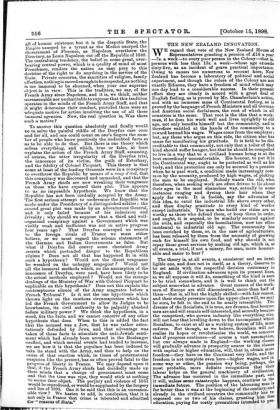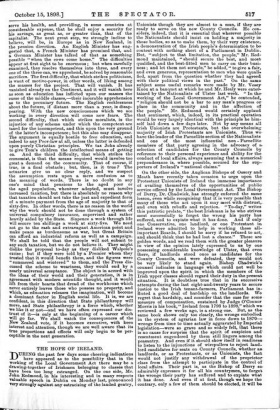THE NEW ZEALAND INNOVATION.
WE regard that vote of the New Zealand House of Representatives granting a pension of £18 a year —7s. a week—to every poor person in the Colony—that is, persons with less than 13s. a week—whose age exceeds sixty-five, as an incident of grave practical importance. Owing to causes too numerous to recount here, New Zealand has become a laboratory of political and social experiment, and though the rulers of the Colony are not exactly Edisons, they have a freedom of mind which may one day lead to a considerable success. In their present effort they are clearly in accord with a great deal of English feeling, as is proved by Mr. Chamberlain's action, and with an immense mass of Continental feeling, as is proved by the language of French Ministers and all German and Austrian social declaimers, the root of which in all countries is the same. That root is the idea that a work- man, if he does his work well and lives uprightly to old age, not only benefits himself but the community, and is therefore entitled at the hands of the community to a reward beyond his wages. Wages come from the employer; but, say those who argue on this side, the citizen also has cause for manifesting his gratitude. It is held to be dis- creditable to that community, not only that a toiler of that kind should suffer hunger, but that he should be compelled to live in a way that to a civilised human being is at the best exceedingly uncomfortable. His honour, to put it in the Continental way, ought to be protected as well as his body, and this protection can only be secured by a pension when he is past work, a condition made increasingly com. mon by the necessity, produced by high wages, of picking the men to be employed. Nobody wants the old, who, therefore, when seeking work are often driven to lie about their ages in the most shameless way, actually in some instances rouging and dyeing their hair when they apply for work. It is foolish, say the advocates of this idea, to extol the industrial life above every other, and then display gratitude to every kind of worker except industrials. The men who build our cities are as worthy as those who defend them, or keep them in order, and ought, it is argued, to be similarly secured against the evils, and especially the humiliations, now too often incidental to industrial old age. The community has been enriched by them, or, in the case of agriculturists, has been released by them from the necessity of growing each for himself his own food, and why should it not repay those great services by making old age, which is, at all events, a trial, if not a misery, for man, more honour- able and easier to bear ?
The theory is, at all events, a consistent and an intel- ligible one, and does not in itself, as a theory, deserve to be set aside with the respectful derision customary in England. If civilisation advances upon its present lines, as we all suppose it will do, something of the kind is sure to be tried somewhere, and it is well to think out the subject somewhat in advance. Great masses of the work- men of Europe are still discontented, more than half of them—that is, all but the highly skilled—with fair reason, and their steady pressure upon the upper class will, we may be sure, be felt in the end to be nearly irresistible. The dreams of the Socialists, it is true, are dreams, first because men are and will remain self-interested, and secondly because the competent, who govern industry like everything else, will not bear that levelling down to the incompetent which Socialism, to exist at all as a working system of life, must enforce. But though, as we believe, Socialism will not realise its hopes or revolutionise the world, we conceive that if progress continues—of course a vast assumption, but one always made in England—the working classes will gradually advance in prosperity nearer to the classes with capital or higher education, will, that is, obtain more freedom—they have on the Continent very little, and the freedom is not complete even here—higher wages, and in some way or other, the pension way being, perhaps, the most probable, more definite recognition that their labour helps on the general machinery of civilisation. The advance has occurred in the immediate past, and it will, unless some catastrophe happens, continue in the is immediate future. The position of the labouring man far better than it was at the beginning of the century, and already in the civilised countries the community has re- cognised one or two of his claims, granting hula free education, paying for costly precautions intended to pre- serve his health, and providing, in some countries at considerable expense, that he shall enjoy a security for his savings, as great as, or greater than, that of the capitalist. The next great step, we strongly incline to believe, will be, in Europe as in New Zealand, in the pension direction. An English Minister has sug- gested that, a French Minister has promised that, and a German Minister has talked of that as something possible "when the cows come home." The difficulties appear at first sight to be enormous ; but when carefully examined, they resolve themselves into three, and every one of the three can, we apprehend, be solved by reasonable sacrifices. The first difficulty, that which strikes politicians, is want of motive-power, in other words, of liking among the masses for the project. That will vanish. It has vanished already on the Continent, and it will vanish here as soon as education has inflicted upon our masses the curse of the middle classes,—their incurable apprehension as to the pecuniary future. The English recklessness about the future, if distant more than a year, is disap- pearing. With the new consciousness which we see working in every direction will come new fears. The second difficulty, that which strikes moralists, is the injustice of any scheme under which the competent are taxed for the incompetent, and this upon the very ground of the latter's incompetence ; but this also may disappear. The argument is equally hostile to free education, and indeed to any Poor-law at all, unless the latter is defended upon purely Christian principles. We tax John already to give Tom's children the intellectual means of getting on. And the third difficulty, that which strikes the economist, is that the means required would involve too great a demand on the community. That of course, if true, is a final obstacle ; but, then, is it true ? The actuaries give us no clear reply, and we suspect the assumption rests upon a mere confusion as to the meaning of words. There is no doubt in any one's mind that pensions to the aged poor or the aged population, whenever adopted, must involve increased taxation, but there is absolutely no reason why that taxation should not take the just and expedient form of a minute payment from the age of majority to that of sixty-five. In other words, there is no reason in the world why the work should not be done through a system of universal compulsory insurance, supervised and rather heavily aided by the State. Sixpence a week through life will secure ten shillings a week at sixty-five. We need not go to the rash and extravagant American point and make peace as burdensome as war, but Great Britain can afford an industrial reform as well as a campaign. We shall be told that the people will not submit to any such taxation, but we do not believe it. They might dislike the proposal to-day as they disliked Walpole's excise ; but if they were told by a Premier whom they trusted that it would benefit them, and the figures were "summered and wintered" to them, and the Press dis- cussed the scheme to weariness, they would end by a nearly universal acceptance. The object is in accord with the ideas of their world and their generation, it is in agreement with modern scientific thought, and it would lift from their hearts that dread of the workhouse which never entirely leaves those who possess no property, and which, as education releases the imagination' will become a dominant factor in English social life. It is, we are confident, in this direction that State philanthropy will move, and State philanthropy is a force which, whether we like it or not—and we have often expressed our dis- trust of it—is only at the beginning of a career which will go far. We shall watch the consequences of the New Zealand vote, if it becomes executive, with keen interest and attention though we are well aware that its true proportions and effects will only begin to be per- ceptible in the next generation.







































 Previous page
Previous page